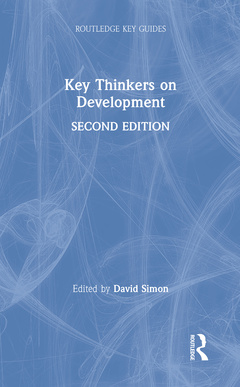Key Thinkers on Development (2nd Ed.) Routledge Key Guides Series
Coordonnateur : Simon David

Since its publication in 2006 as Fifty Key Thinkers on Development, this invaluable reference has established itself as the leading biographical handbook in its field, providing a concise and accessible introduction to the lives and key contributions of development thinkers from across the ideological and disciplinary spectrum. This substantially expanded and fully updated second edition in the relaunched series without the numerical constraint includes an additional 24 essays, filling in many gaps in the original selection, greatly improving the gender balance and diversifying coverage to reflect the evolving landscape of development in theory, policy and practice.
It presents a unique guide to the lives, ideas and practices of leading contributors to the contested terrain of development studies and development policy and practice. Its thoughtful essays reflect the diversity of development in theory, policy and practice across time, space, disciplines and communities of practice. Accordingly, it challenges Western-centrism, Orientalism and the like, while also demonstrating the enduring appeal of "development" in different guises. David Simon has assembled a highly authoritative team of contributors from different backgrounds, regional settings and disciplines to reflect on the lives and contributions of leading authorities on development from around the world. These include:
- Modernisers like Kindleberger, Perroux and Rostow
- Dependencistas such as Frank, Furtado, Cardoso and Amin
- Progressives and critical modernists like Hirschman, Prebisch, Helleiner Sen, Streeten and Wang
- Political leaders enunciating radical alternative visions of development, such as Mao, Nkrumah and Nyerere
- Progenitors of religiously or spiritually inspired development, such as Gandhi, Ariyaratne and Vivekananda
- Development?environment thinkers like Agarwal, Blaikie, Brookfield, Ostrom and Sachs
- International institution builders like Singer, Hammarsköld, Kaul and Ul Haq
- Anti- and post-development thinkers and activists like Escobar, Ghosh, Quijano and Roy
Key Thinkers on Development is therefore the essential handbook on the world?s most influential development thinkers and an invaluable guide for students of development and sustainability, policy-makers and practitioners seeking an accessible overview of this diverse field and its leading voices.
Adebayo Adedeji (1930–2018) Irma Adelman (1930–2017) Anil Agarwal (1947–2002) Elmar Altvater (1938–2018) Samir Amin (1931–2018) Alice Amsden (1943–2012) A.T. Ariyaratne (1931–) Jagdish Bhagwati (1934–) Piers Blaikie (1942–) James M. (Jim) Blaut (1927–2000) Norman Borlaug (1914–2009) Ester Boserup (1910–1999) Harold Brookfield (1926–) Fernando Henrique Cardoso (1931–) Michael Cernea (1934–) Robert Chambers (1932–) Hollis B. Chenery (1918–1994) Diane Elson (1946–) Arturo Escobar (1952–) Frantz Fanon (1925–1961) Fei Xiaotong (1919–2005) Andre Gunder Frank (1929–2005) Paolo Freire (1921–1997) John Friedmann (1926–2017) Celso Furtado (1920–2004) Mohandas (Mahatma) Gandhi (1869–1948) Susan George (1934–) Alexander Gerschenkron (1904–1978) Jayati Ghosh (1955–) Eduardo Gudynas (1960–) Dag Hammarskjöld (1905–1961) Gerald K. Helleiner (1936–) Albert O. Hirschman (1915–2012) Philippe Hugon (1939–2018) Richard Jolly (1934–) Naila Kabeer (1950–) Michał Kalecki (1899–1970) Inge Kaul (1944–) Akhtar Hameed Khan (1914–1999) Charles Poor Kindleberger (1910–2003) Sir William Arthur Lewis (1915–1991) Michael Lipton (1937–) Reverend Thomas Robert Malthus (1766–1834) Mao Zedong (1893–1976) Karl Marx (1818–1883) Manfred Max-Neef (1932–) Terence Gary McGee (1936–) Gunnar Myrdal (1898–1987) Kwame Francis Nkrumah (1909–1972) Ragnar Nurkse (1907–1957) Julius Kambaragwe Nyerere (1922–1999) Elinor Ostrom (1933–2012) François Perroux (1903–1987) Karl Polanyi (1886–1964) Raúl Prebisch (1901–1986) Aníbal Quijano (1928–2018) Joan Robinson (1903–1983) Walter Rodney (1942–1980) Paul Rosenstein-Rodan (1902–1985) Walt Whitman Rostow (1916–2003) Aruna Roy (1946–) Ignacy Sachs (1927–) E.F. (Fritz) Schumacher (1911–1977) Dudley Seers (1920–1983) Amartya Kumar Sen (1933–) Hans Wolfgang Singer (1910–2006) Frances Stewart (1940–) Joseph Stiglitz (1943–) Paul Patrick Streeten (1917–2019) James Tobin (1918–2002) Mahbub Ul Haq (1934–1998) Swami Vivekananda (1863–1902) Wang Hui (1959–) Eric R. Wolf (1923–1999) Peter Worsley (1924–2013)
David Simon is Professor of Development Geography at Royal Holloway, University of London, UK, and Director of Mistra Urban Futures, Chalmers University of Technology, Gothenburg, Sweden. He is author, editor and co-editor of many books and journal special issues on cities, development–environment challenges and climate change adaptation, most recently Rethinking Sustainable Cities: Accessible, Green and Fair (2016), Urban Planet (2018) and Holocaust Escapees and Global Development: Hidden Histories (2019).
Date de parution : 04-2019
13.8x21.6 cm
Disponible chez l'éditeur (délai d'approvisionnement : 14 jours).
Prix indicatif 117,69 €
Ajouter au panierDate de parution : 04-2019
13.8x21.6 cm
Thèmes de Key Thinkers on Development :
Mots-clés :
Held; USA; developmental state; UN; industrial transformation; North; East Asia; Postwar; development; Follow; underdevelopment; IMF; structuralism; Keynes; Cambridge-Cambridge controversy; Fellowship; disguised unemployment; Cambridge University; Gwalior; Cambridge; labour-absorbing technique; International Monetary Fund; Marxian unemployment; ECLA; socialist alternative; United Nations Development Programme; Ecodevelopment; Walt Rostow; Third-World; Human Development Index; South-South cooperation; Refocused; comparatism; Henrique; energetic transition; Tour; rural development; Birthday; Payments; Hollis Chenery; Anu; Wandering; Unlimited



